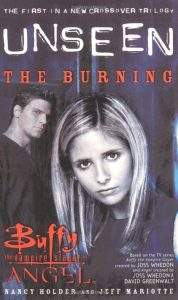 Over the past week, I’ve been putting in some low-rent reading time with the first book of Unseen, a Buffy/Angel crossover trilogy set during the summer between the fourth and fifth seasons of Buffy (and therefore the first and second seasons of Angel). As such, I’ll be basically unable to talk about the book without spoilers up to those points. If you care, you have been warned.
Over the past week, I’ve been putting in some low-rent reading time with the first book of Unseen, a Buffy/Angel crossover trilogy set during the summer between the fourth and fifth seasons of Buffy (and therefore the first and second seasons of Angel). As such, I’ll be basically unable to talk about the book without spoilers up to those points. If you care, you have been warned.
The Burning, like the trilogy itself, delivers on the title. There’s a really big oil field fire. And maybe another fire as well, if I remember right, but not in an oil field. And basically every character, at some point, muses about how they are unseen, literally, metaphorically, or both. The theme is floating right there on the surface, like oil on poisoned well water.
What it doesn’t deliver on is a crossover. There are three distinct plots, more than one subplot, and nothing tying any of them together. Cordelia wants to save a group of Lost Girls, Angel wants to save a kid and his falsely accused murderer father after one of the trademark PTB visions, Willow wants to save a college pal’s brother from his bad choices, Spike wants his vampire girlfriend du jour to introduce him to her (still-living) thesis advisor, who might have an angle on removing the chip from his head, and Buffy wants to save lots of people from a mysterious shadow monster that is wandering Sunnydale rending people into bits. As of the end of the first book, none of these storylines appear to be in any way related to any of the others.
As badly written as that part of the book is, I might be able to forgive it as belonging to later books in the trilogy, if not for the fact that the characters also fail to cross over in any meaningful sense. We’re treated to Angel and Buffy each privately angsting about the other’s lack of consideration after a short phone call near the end, plus a “surprise” meeting just as the curtain falls, complete with Riley posturing manfully about what a dick his girlfriend’s ex- can be.
The sad part is, without the terrible advertising done by the book cover, the actual plotlines themselves are easily interesting enough to hold the attention. (I mean, I knew what I was getting into in that regard from the start, and as low-rent goes, it’s fine. Even though I spent a paragraph above mocking the [lack of] depth.) But the dissonance is too much to overcome, and so I complain. I’ll still read the other two books eventually and hope that the next one delivers what this failed to do.